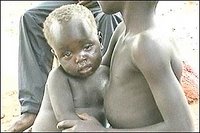Maxwell is from Zimbabwe. He was born and raised there and has lived in the States for about three years now. He is married and watches the BBC. Maxwell is black. He is different than me and yet so much the same. I asked him about Zimbabwe and if the things I hear and read are true...is Mugabe that bad...? Was Britain at fault for what has become of the country...? who is who there...? It was great talking with Maxwell. Enlightening. We aren't too different. He didn't know about who was to blame. He did know that there is a problem in Zimbabwe - no food - of course there is food for the rich, but no food for the poor.
Before the civil war in 1980, Britain controlled Zimbabwe and thus, white men controlled Zimbabwe. White men had big farms. White men had big food. Civil War takes place, dictators happen, power happens, Mugabe happens. Food is scarce. Farmers are killed. Less food. People die. Maxwell knows change must happen or his country will continue downhill. He is leaving in two weeks for a two week trip to his come country. I wished him well.
Then I found this article on the food problem in Zimbabwe. Check it out...
Famine plagues Zimbabwe
Up to seven million Zimbabweans face starvation
By Fergal Keane
BBC correspondent in Zimbabwe
Posing as tourists, we evaded President Robert Mugabe's police and his army of spies and found, hidden from the world, a nation's tragedy.
Hungry people queue for the meagre rations offered by church workers - their children's hair already changing colour from malnutrition. The elderly too are beginning to suffer terribly - not much food and not much hope of it either. Misrule, corruption and drought are combining to make a catastrophe.
Scavenging
Among the poorest of the poor, some compete with wild animals for what they can scavenge. Many people have abandoned their homes in search of food and work.
"For three days I haven't eaten, because of this I have no energy, that is why you see me here," explained one man that we met.

Yet the commercial farms that could have provided much of the food needed are lying abandoned, their owners forced out. Jenny Parsons, one such farmer, and her children, tried to visit their family farm and were attacked by government supporters.
"Every time I tried to get back to the truck to protect the kids more of them came and started punching me and kicking me into a hallway," she recounted.
Even the children were not spared. "They were trying to treat me like a dog, as if I were dirt," explained one of her sons, tears streaming down his face. "It was really scary."
Torture chambers
Fear now rules Zimbabwe. Harare, the capital, now has secret torture chambers. Being caught filming could mean up to two years in jail. As the economic crisis gets worse so does the level of government repression. Nobody who opposes the government now is safe from torture, from arbitrary imprisonment.
We met a group of people, many of them high profile, who have just been released from police custody. In this country even members of parliament and human rights lawyers can end up in torture chambers. All of those we met said they had been subjected to electric shock torture.
"They electrified me on my genitals, on my toes, in my mouth, and they said 'this is the mouth you use to defend human rights,'" said Gabriel Shumba, a human rights lawyer.
"The world must know of the kind of life that the people of Zimbabwe are living under. It is terrible," Job Sikhala, an opposition member of parliament, said from his hospital bed, where he is recovering.
'Land of empty plate'
Petrol queues throughout the city are a symptom of the crisis.
The England cricket squad will see them when they visit, but the government will crack down hard on any demonstrators. That is just one reason why the mayor of Harare, Elias Mudzuri, wants the England cricketers to stay at home.
"How many more people are likely to be dragged into the cells because they think they are perceived to be disturbing the cricket and the cricket people must be seen to be seeing that Zimbabwe is a good destination?" he asked.
Back in the rural areas the people gather wild plants, a traditional meal in times of hardship. The United Nations warns that seven million people now face starvation.
This is my third undercover trip into Zimbabwe in the last 12 months and the situation has deteriorated drastically. Yet nobody here seems to doubt that change is coming. The only question is whether it will be peaceful or violent.
This land of the empty plate attracts little attention from the powerful nations of the world, but they could soon find themselves facing a dramatic crisis here.
No comments:
Post a Comment